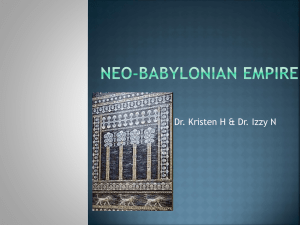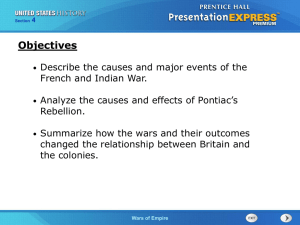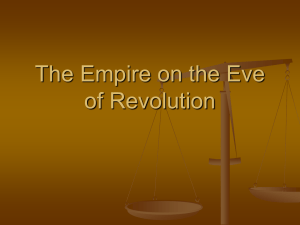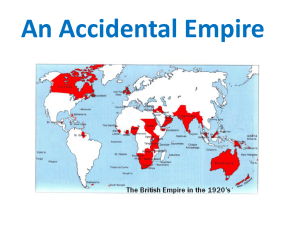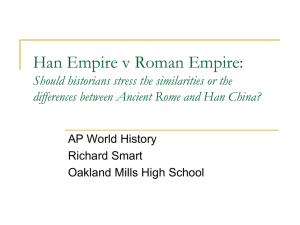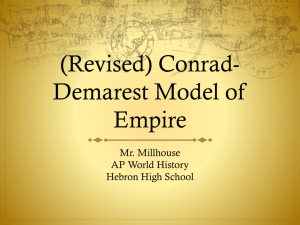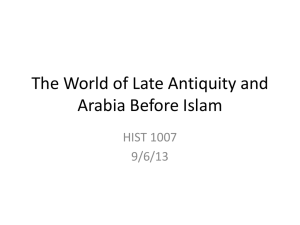OfthePeople_Ch04
advertisement
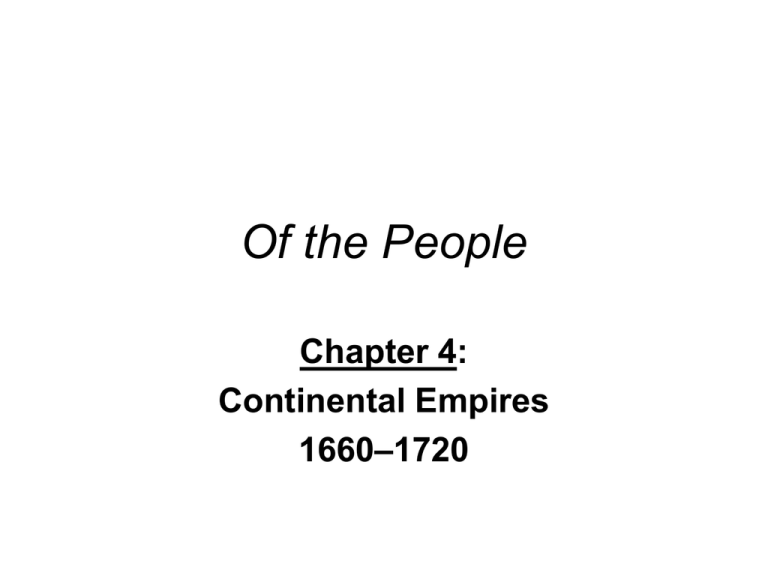
Of the People Chapter 4: Continental Empires 1660–1720 Common Threads >> What forces—political, economic, military, social, cultural—gave shape to the English empire? Which of these forces figured in the conscious plan of empire, and which shaped the empire nonetheless? >> How did imperial politics—in particular the contest between England and France and England’s larger geopolitical objectives—affect the lives of ordinary men and women in the colonies? >> What is a slave society, and how did Virginia become one? >> Which European institutions transplanted easily to North America, and which did not? Continental Empires 1660-1720 • Overview – – – – – – – The Plan of Empire New Colonies, New Patterns The Transformation of Virginia New England Under Assault The Empire Strikes Massachusetts in Crisis Empires in Collision Continental Empires 1660-1720 • The Plan of Empire – Turmoil in England – The Political Economy of Mercantilism Continental Empires 1660-1720 • New Colonies, New Patterns – New Netherland Becomes New York – Diversity and Prosperity in Pennsylvania – Indians and Africans in the Political Economy of Carolina – The Barbados Connection Continental Empires 1660-1720 • The Transformation of Virginia – Social Change in Virginia – Bacon’s Rebellion and the Abandonment of the Middle Ground – Virginia Becomes a Slave Society Continental Empires 1660-1720 • New England Under Assault – Social Prosperity and the Fear of Religious Decline – King Philip’s War – Indians and the Empire Continental Empires 1660-1720 • The Empire Strikes – The Dominion of New England – The Glorious Revolution in Britain and America – The Rights of Englishmen – Conflict in the Empire Continental Empires 1660-1720 • Massachusetts in Crisis – The Social and Cultural Contexts of Witchcraft – Witchcraft at Salem – The End of Witchcraft Continental Empires 1660-1720 • Empires in Collision – France Attempts an Empire – The Spanish Outpost in Florida – Conquest, Revolt, and Reconquest in New Mexico – Native Americans and the Country Between Continental Empires 1660-1720 • Conclusion AMERICAN PORTRAIT Tituba Shapes Her World and Saves Herself “Instability...creates opportunity at the same time that it creates danger. By melding her own culture and that of her captors, Tituba became a cultural shape-shifter, and she was able to save herself.” • Salem witchcraft trials, 1691: The Spark – In Salem, Mass., two young girls (cousins: Betty and Abigail), who had become interested in folk magic, suddenly began experiencing inexplicable fits of pain. • Betty’s father, Rev. Samuel Parris, suspected that the girls had been bewitched. • The girls identified three women as the responsible witches: Sarah Good, Sarah Osborne, and Parris’s slave, Tituba. • Upon questioning, Tituba not only confessed her guilt, she went on to describe an elaborate story which involved the appearance of the Devil, with whom she and the others had signed a blood covenant. • The shocked interrogators concluded that their town was infested with witches. • What was the cultural shape-shifting demonstrated by Tituba? – As her story reflects, why were such abilities important for people in her circumstances in late 17th century colonial British America? The Plan of Empire “So long as the mainland colonies contributed little to the national wealth and cost the government less, the government was willing to exercise only the loosest of controls and permit each of the colonial societies to develop in its own way.” “The result was a period of significant instability at the end of the seventeenth century, as local colonial governments struggled to control their own inhabitants, police their borders, and establish successful economies.” – Turmoil in England • King Charles II (r. 1660-1685); King James II (r. 1685-1688) “In the middle decades of the seventeenth century, the British government was thrown into turmoil as Parliament and the king struggled over the future direction of the nation.” • Two overlapping points of contention: religion and royal power – The Political Economy of Mercantilism • How did the theory of mercantilism shape the geopolitical arrangement of empires? – How did the Navigation Acts serve British mercantilist objectives? New Colonies, New Patterns “As a rule, the most successful colonies offered the most opportunity to free white people and the greatest amount of religious toleration.” – New Netherland Becomes New York, 1664 • During a period of hostile competition between Britain and the Netherlands over the trans-Atlantic market, King Charles gives his younger brother James, the Duke of York, title to the land claimed by the Dutch as New Netherland. – With a large show of force, the British forced the Dutch colonists to surrender their land to British rule. • Why was James compelled to grant the colonists of New York religious and political freedoms? – Diversity and Prosperity in Pennsylvania • What were the political and religious circumstances in which William Penn was granted his 1681 charter from Charles II? • What kind of colony was created as a result of Penn’s policies? – How did the diversity and prosperity generated by these policies undermine his vision for the colony? New Colonies, New Patterns – Indians and Africans in the Political Economy of Carolina • The Carolina constitution designed by Anthony Ashley Cooper (the Earl of Shaftesbury) combined democratic and feudal elements: – A representative government and toleration of religion – Hereditary rules, which placed an elite group of nobles at the top and hereditary serfs (and black slaves) at the bottom » Why is it predicable that these rules would be overturned in effect? “As might have been predicted…the only aristocracy that the Carolinas developed was one of wealth, supported by the labor of slaves.” – The Barbados Connection • How did this connection shape Carolina differently from the other British colonies? The Transformation of Virginia “At the same time that a newly invigorated England was planting new colonies, those established earlier were reshaped…[as a result of] political and sometimes social instability.” – Social Change in Virginia • An elite class of planters/legislators emerges – Bacon’s Rebellion and the Abandonment of the Middle Ground, 1676 • What circumstances led to the collapse of the Indian-English middle ground in the Virginia frontier? • Why did this lead Nathaniel Bacon and his followers to mount an uprising against Governor Berkeley? “Significantly, the rebels sought not to overthrow the social and political order but to secure economic opportunity and a legitimate government that protected that opportunity. In its aftermath, Virginia became a slave society.” The Transformation of Virginia – Virginia Becomes a Slave Society • Universal elements of slavery: – perpetuity, kinlessness, violence, and the master’s access to the slave’s sexuality • Added American elements: – racial basis, hereditary bondage, and the rarity of manumissions (especially in the South) – What were the circumstances that led to the increase in freedom for whites in colonial America? • The widespread availability of cheap land – acquired by dispossessing the Indians who inhabited it • The policies of the British government, which granted selfgovernment in the colonies – implemented in order to attract immigrants • The specific laws that improved the conditions of whites – often at the same time limiting the freedom of blacks New England Under Assault “As the New England colonies prospered, their prosperity led to problems, both internal and external.” – Social Prosperity and the Fear of Religious Decline • How did Puritan religious ideals come to clash with economic prosperity in New England? – King Philip’s War, 1676 • Sparked in the same year as Bacon’s Rebellion; what characteristics did these two conflicts share in common? – Likewise, what was the legacy of King Philip’s War on future relations (the Middle Ground) between the English and southern New England Indians? • What pivotal role did the Mohawks play in this war? – What does their involvement indicate about English-Indian relations? – Indians and the Empire • How did New York Governor Andros use his alliance with the Mohawks to give his colony an advantage over the New England colonies in the wake of war? The Empire Strikes “As Britain regained political stability at the end of the seventeenth century, it tried to bring more order to its ‘accidental empire,’ not so much by interfering in colonial affairs as by making the colonies play a larger role its empire.” – The Dominion of New England • In the wake of reports that New Englanders were defying the Navigation Acts and at the same time limiting the freedom of (non-dissenting) religion, James II (who declared that he was Catholic) decided to reign them under tighter control. • What punitive measures did James and governor Andros implement? – The Glorious Revolution in Britain and America, 1688-1691 • How did the new form of British government reflect the principles outlined in John Locke’s Treatises (1690) • How did colonists in New York and Maryland take advantage of the revolution in England? The Empire Strikes • The Empire Strikes – The Rights of Englishmen • What were the rights of Englishmen? – Civil rights – Self-government • How did the viewpoints of colonists and imperial officials diverge on the issue of English rights? – For imperial officials: » The colonies were children (dependents) of the mother country » The good of the empire as a whole was more important than that of any one of its parts » Just as the colonies were subordinate to the empire, the colonial governments were subordinate to the British government » The British government had complete jurisdiction over every aspect of colonial life – Conflict in the Empire: Britain vs. France • King William’s War (1689–1697) and Queen Anne’s War (1702–1713) – What patterns were repeated in the American manifestations of these wars? Massachusetts in Crisis “If the imperial wars provide a window onto international tensions, the Salem witchcraft trials provide a window onto a society in crisis….” The Social and Cultural Contexts of Witchcraft • Why were the inhabitants of Massachusetts especially anxious in 1692? – Ineffective government owing to the lack of a charter – King William’s War – Increasing population coupled with a scarcity of land • What increased pressures did women face? “Even in a society that believed in witchcraft, the execution of so many people at once was an aberration that revealed deep tensions.” – Witchcraft at Salem, 1691 • 156 jailed; 20 executed • In what ways did the accusations of witchcraft—targeting outcast or wealthy women—reflect the broader anxieties of this Puritan society? – The End of Witchcraft • The end of New England’s “providential” self-image Empires in Collision – France Attempts an Empire • What new plan for New France was envisioned by France’s minister Jean Baptiste Colbert? – What were the economic and political reasons for the construction of new forts? • Contrary to Colbert’s plans of an hierarchical society, what kind of society was created in Louisiana as result of France’s lack of support? – As compared with other (English and French) colonies, what extended freedoms did Indians and Black slaves enjoy in this society? – The Spanish Outpost in Florida • “The border between [Florida and Carolina] was a place of violence—and also, for Africans, a place of opportunity.” (p. 41) – How did Africans take advantage of this violent borderland? Empires in Collision – Conquest, Revolt, and Reconquest in New Mexico • In what ways did Franciscan rule in New Mexico pave the way for the Pueblo Revolt, 1680? – What was the impact of the revolt on future rule of Indians in New Mexico? – Native Americans and the Country Between • Plains Indians enjoyed easy access to European entrepôt – How did the Indians’ acquisition of horses and guns transform the Plains? Continental Empires 1660-1720 • Revisiting the Common Threads >> What forces—political, economic, military, social, cultural—gave shape to the English empire? Which of these forces figured in the conscious plan of empire, and which shaped the empire nonetheless? >> How did imperial politics—in particular the contest between England and France and England’s larger geopolitical objectives—affect the lives of ordinary men and women in the colonies? >> What is a slave society, and how did Virginia become one? >> Which European institutions transplanted easily to North America, and which did not?

